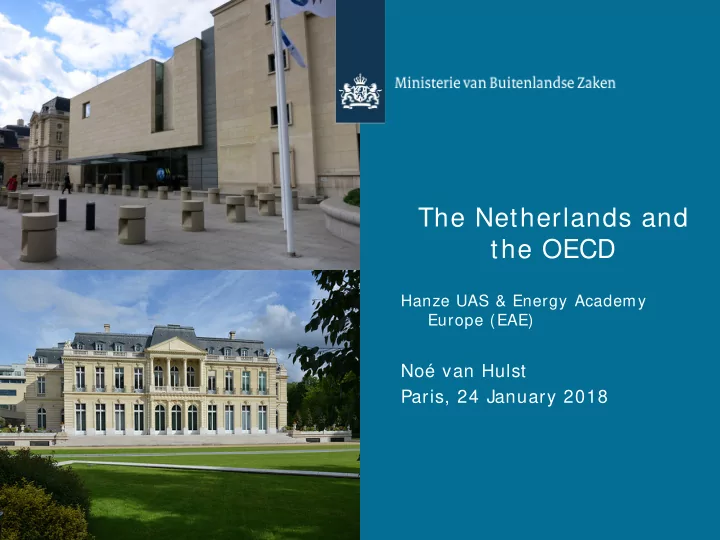

The Netherlands and the OECD Hanze UAS & Energy Academy Europe (EAE) Noé van Hulst Paris, 24 January 2018
Agenda 1. The OECD and the developments 2. The new thinking of the OECD 3. SWOT-analysis of the Netherlands through an OECD lens 4. How could the Netherlands do more with the OECD? 5. G20 6. Working at the OECD? 2
OECD Development 1 • Founded in 1960 by 20 countries (18 EU-countries, NL incl., plus US and Canada) • New plan after identity crisis (2003/ 2004): i. Supplier G7/ G20 ii. Think tank: exchange of good practices and evidence-based policy iii. (soft law) Guidelines for companies (CSR, anti-corruption) • In response to the economic crisis (2007): New Approaches to Economic Challenges (NAEC) 3
OECD Development 2 Where to go with the OECD? Closer co-operation with non-OECD countries (especially emerging economies) Key partners: India, South-Africa, Brazil, China and Indonesia Expansion, 2 schools: 1. Go global 2. Only like-minded 3rd option: specific instruments (watch ‘cherry-picking’) 4
The “new” OECD-thinking “Better Policies for Better Lives” 1. Well-being (beyond BNP) 2. Inclusive growth 3. Sustainable growth transition to decarbonized economy 4. More focus on Micro-/ Big Data, regions/ cities 5
How’s Life in the Netherlands? (OECD, 2017) 6
NL through an OECD lens I STRENGTHS WEAKNESSES • • High trade integration Stagnant labour productivity (growth) • • High GDP per capita High household debt • • Robust fiscal framework Low elasticity of housing supply • • Pension sustainability Underdeveloped private rental market • • Stable institutions Large tax incentives for home ownership • • Consensus policy and decision-making (‘polder model’) Lack of innovation and growth of small, young firms • • High education and skills level Low SME collaboration on innovation • • World-class universities Low labour market participation (65-69) • • High entrepreneurship High long term unemployment • • Large number of multinational firms Gender gap • • High employment rates (16-65) Low amount of working hours (women) • • Good physical and digital infrastructure High protection of permanent contracts • • International reputation major cities Poor labour market integration of immigrants • • Innovative clusters Costs mental health at work • • High and good healthy life expectancy Low renewable energy sources • • Low income inequality, good safety nets Energy-intensive industrial structure • • High life satisfaction/work-life balance Weak economic incentives for environmental improvement • Personal security • World-class product market regulation • World-class agricultural sector • World-class water management • World-class gas sector * PV OESO op basis van OESO-rapporten NL (2017) 7
NL through an OECD lens II OPPORTUNITIES/CHALLENGES THREATS/RISKS • • Healing household and bank balance sheets Population ageing • • Developing non-bank sources of finance Weak growth impulse from abroad • • Supporting growth of small/young firms (e.g. through financing), Exposure of the large financial sector to shocks • involving them in top sector approach Exposure of banks to high household debt • • Improving connection top sector approach & EU regional cluster Major credit constraints for SMEs • policies Hit of the crisis on tangible investment • • Identifying possible new strength areas top sector approach Low business investment in intangible capital • • Stronger focus innovation policy on joint R&D projects private Falling gas extraction and risks to energy security • sector with knowledge institutes Governance complexity • • Increasing service-sector liberalization Slow reactivity of ‘polder model’ to crisis (which may hinder • Further reducing barriers to entrepreneurship more innovative policy approaches as well) • • Further improving product market regulation (e.g. licensing and Changes funding regime fundamental research • permits) Low share of science and engineering graduates • • Increasing incentives to work longer Rising regional disparities • • Supporting active labour market policies High exposure to floods and climate change impacts • • Reducing labour market dualism High air pollution + CO2 emissions • • Designing a national urban policy High road congestion • • Improving connectivity of metropolitan areas Potential adverse effects on the financial sustainability of water • Adjusting growth to new demand patterns management in the long run • • Consolidating world-class flood defences High health spending (also per capita) • Better using of human capital potentials * PV OESO op basis van OESO-rapporten NL (2017) 8
How could NL do more with the OECD? • Learn of and exchange experiences with other countries (learning economy) OECD = “house of good practices” “becoming an improved version of ourselves” • Influence the agenda and strategic direction more • Push NL priorities : open trade/ investment climate, CSR, sustainability, level playing field, innovation • Steering the agenda setting of the G7/ G20 via the OECD • Apply at the OECD! 9
G20: growing role in ‘Economic Governance’ • Phase 1 (1999 – 2008): Ministers of Finance and Central Bankers of the G20 • Phase 2 (2009 – now): G20-leaders in Summits, leaders appoint G20 as primary forum for international economic co-operation • Phase 3 (2010 – now): Focus of the G20 is expanding (not strictly financial and economical anymore) The Netherlands in the G20: 2008/ 2009 + again in 2017/ 2018… ? Fundamental question: Will non-G20 countries become ‘policy- takers’? 10
Working at the OECD: apply http: / / www.oecd.org/ careers 11
Working at the OECD?: recruitment http: / / www.oecd.org/ careers/ howwerecruit 12 31-01-2018
Working at the OECD?: career http: / / www.oecd.org/ careers/ yourcareerattheoecd 13 31-01-2018
Thank you for your attention Twitter: @noevanhulst Twitter PV: @NLmissionOECD Facebook PV: Permanent Delegation of the Kingdom of the Netherlands to the OECD 14
Recommend
More recommend